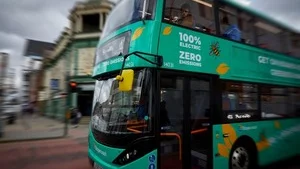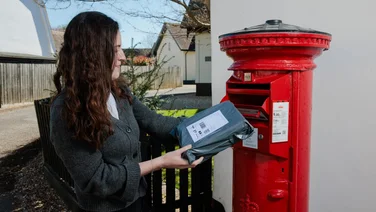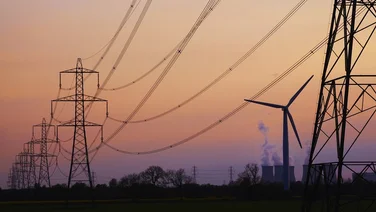✔ The UK government announced the ban on 14 January 2023
✔ Billions of single-use plastic cutlery and plates will be banned
✔ Supermarkets and shops are exempt from the ban
Plastic is the single-most damaging material on earth, and it’s single-use plastic in particular that’s been wreaking havoc on the environment for decades.
The UK has made tentative steps to address the issue with a new ban on single-use plastic announced in January 2023.
We’ve asked whether the ban goes far enough, looking at the reasons behind the ban, what its impact will be, and how it compares to the rest of Europe.

The plastic cutlery and plates ban explained
Thérèse Coffey, the Secretary of State for Environment, Food and Rural Affairs, announced a ban on single-use plastic plates, cutlery, and polystyrene cups on 14 January 2023.
This comes two years after the UK government banned plastic straws, cotton buds, and microbeads in some beauty products in England.
The problem is that it only extends to takeaways, leaving supermarkets and shops exempt from the ban. This’ll do little to really stem the flow of plastic waste making its way to landfill, rivers and oceans, into the food chain, and ultimately, onto our plates and into human bodies.
When does the ban start?
The ban is expected to start in October 2023, making England the third country in the UK to enact a waste plastic ban, with the Scottish and Welsh governments implementing their bans 12 August 2022 and Autumn 2023 respectively.
It’s also over a year since an investigation by Greenpeace and non-profit research group Everyday Plastic found that the UK throws away over 100 billion items of plastic every year.
It’s good to see any ban on plastic finally get pushed through, but when the dangers of plastic waste have been known for so long, it’s a wonder it hasn’t happened sooner.

Why has the UK banned single-use plastic cutlery and plates?
Thérèse Coffey said that:
“We all know the absolutely devastating impacts that plastic can have on our environment and wildlife. We have listened to the public and these new single-use plastics bans will continue our vital work to protect the environment for future generations.”
It’s a statement that gives the government’s decision to ban single-use plastic cutlery and plates a noble air, but the reality is that the Scottish and Welsh governments practically shamed the UK government into implementing the ban.
In already moving to ban plastic waste last year, both Scottish and Welsh governments showed the UK a willingness to lead on handling the critical issue of plastic pollution.
Westminster is playing catchup, as is often the case on environmental policy for the current government.
Take the carrier bag charge for example — in 2011, Wales was one of the first countries in the world to introduce a charge for single-use carrier bags. The UK government didn’t introduce the same measure until 2015.
What will be the impact of the plastic cutlery ban?
Roughly 1.1 billion plates and 4.25 billion items of cutlery will no longer be made each year.
This’ll mean a reduction in the amount of plastic waste being thrown on UK streets, of which plastic cutlery ranks among the top 15 most frequently discarded items of plastic.
It’ll also mean less plastic making its way into our oceans and rivers — albeit only making a small dent in the frankly shocking amount of plastic leaking into the environment.
Wood will replace plastic as the dominant material used in disposable cutlery, but it’s not hugely popular and some argue the government should encourage the use of reusable cutlery.
Is the plastic cutlery ban good enough?
The plastic cutlery ban is a start, but nowhere near good enough to really tackle the issue of plastic pollution.
It only extends to takeaways and food outlets, meaning supermarkets and shops are completely exempt and will continue to use single-use plastic in their products — for the time being at least.
There’s an air of grandstanding around the wafer-thin ban, and it’s clear the government seems unwilling to really face the problem of plastic head on.
It frames plastic pollution as the problem of individuals and small food businesses, who themselves have little financial incentive to move away from single-use plastic cutlery and plates.
This takes the blame away from the real culprits, the global petrochemical industry responsible for the production of the materials needed to make the world’s plastics.
It also makes it obvious that the government is reluctant to take the fight to big business — 20 of the world’s largest companies produce an astonishing 55% of all plastic waste around the planet.
So the ban feels little more than weak legislation for the government to point to and say they’re doing something. It still doesn’t account for the huge amounts of plastic pollution the UK is responsible for — roughly 2.5 million tonnes of plastic waste is chucked away each year.
All this plastic waste will take hundreds of years to decompose, and when it does, the decomposing plastic will likely leak into the soil and eventually the groundwater.
How does the UK’s plastic cutlery ban compare to the rest of Europe?
The EU banned single-use plastic plates, cutlery, straws, balloon sticks, and cotton buds from markets of EU Member States in July 2021, a full two years and three months before the UK’s ban is set to come into effect.
Specific targets for recycling single-use plastic have been introduced too, unlike the UK’s own ban which makes scant mention of this. The government’s announcement of the ban only contained this passing comment from Environment Minister, Rebecca Pow:
“By introducing a ban later this year we are doubling down on our commitment to eliminate all avoidable plastic waste. We will also be pressing ahead with our ambitious plans for a deposit return scheme for drinks containers and consistent recycling collections in England.”
No specific date for the deposit return scheme has been given, in contrast to the EU’s target of 77% of all plastic bottles being recycled by 2025, increasing to 90% in 2029.
The UK government’s ban also doesn’t include cigarette butts, which make up a big part of plastic pollution, whereas the EU’s directive on single-use plastics does.
Summary
The government’s ban on single-use plastics is a start, but it doesn’t go nearly far enough. In limiting its scope to takeaways and food outlets, the ban fails to address the vast quantities of plastic waste coming from other businesses within the UK.
And while any ban on plastics is to be welcomed, the government seems unwilling to take it a step further and find a solution to our current plastic addiction.
There’s no denying plastic is – and will remain – an essential part of modern society for some time to come, but with proper management and better recycling infrastructure, the damage plastic causes could be limited to a much greater degree.
Although creative solutions to managing the plastic crisis exist, the government should be doing much more to reduce the amount of plastic being discarded.






